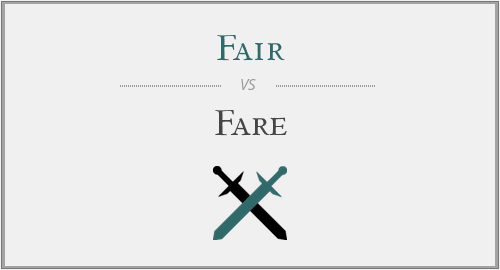English language is filled with difficult and puzzling type of words. One of the type of words is homophones that are pronounced the same way but mean and spell differently. The words we are discussing today are one of the common pairs of homophones. Fair and fare.
With the help of this article, I will illustrate the difference between the two words, highlighting their contextual meanings. At end, I would explain a useful trick to help you utilize on board or onboard accurately in your writing instantly.
Origin:
The word fare originated from Old English fær, faru ‘travelling, a journey or expedition’, faran ‘to travel’, also ‘get on (well or badly’), of Germanic origin; related to Dutch varenand German fahren ‘to travel’, Old Norse ferja ‘ferry boat’, also to ford. The word fair originated from Old English fæger ‘pleasing, attractive’, of Germanic origin; related to Old High German fagar.
Fare as noun:
Fare is used as a noun which means the money paid for a journey on public transport.
We should go to Seville, but we cannot afford the air fare.
Fare as verb:
Fare is also used as a verb which means to perform in a specified way in a particular situation or over a particular period.
The party fared badly in the elections.
Fair as adjective:
Fair is used as an adjective which means treating people equally without favouritism or discrimination.
The group has achieved fair and equal representation for all its members.
Fair also refers to hair or complexion of light tone; blonde.
Fair vs. Fare
A pretty girl with long fair hair was walking down the street.
Fair as adverb:
Fair word can also be used as an adverb in the language as that means to achieve something to fair and in a rightly manner with no tricks.
No one could say he played fair.
Fair as noun:
Fair is also used as a noun which means a beautiful woman.
He was pursuing his fair in a solitary street.
Examples:
At many campuses, an underground market for chips, candy, fast-food burgers and other taboo fare is thriving. [Los Angeles Times]
Major League Baseball’s annual trade fair is underway in Dallas. [National Post]
Commuters could be offered cheaper early morning fares in an attempt to ease congestion on London’s transport network. [Evening Standard]
Spring Hill prison has seen its fair share of hairy inmates. [Stuff.co.nz]
Fair or fare:
Fair and fare although share the same pronunciation, they have very different meaning as fare is both a verb and a noun that means to either triumph and as noun, it means to the monetary value spent on communal transport. Remember, the easiest way to remember the difference between the two words is to see the last two words of the word ‘fare’.





Have a discussion about this article with the community:
Report Comment
We're doing our best to make sure our content is useful, accurate and safe.
If by any chance you spot an inappropriate comment while navigating through our website please use this form to let us know, and we'll take care of it shortly.
Attachment
You need to be logged in to favorite.
Log In